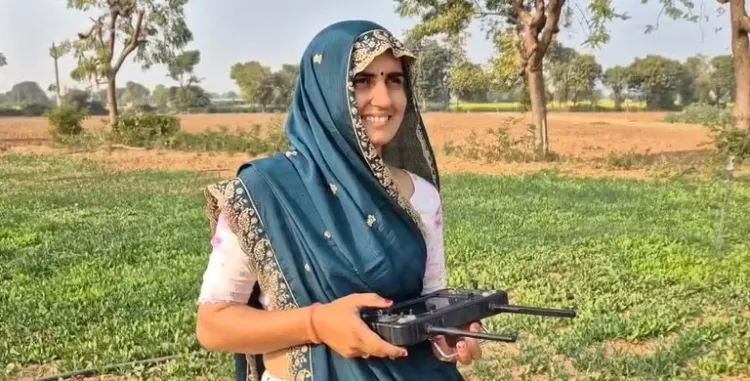How is a Woman from Gujarat's Banaskantha Changing Farmers' Lives with the 'Namo Drone Didi' Scheme?

Synopsis
Key Takeaways
- Ashaben Chaudhary is transforming farming with drone technology.
- The Namo Drone Didi Yojana empowers rural women.
- Drones reduce time and effort for pesticide spraying.
- The initiative aims to equip 15,000 SHGs by 2025-26.
- 80% of drone costs are subsidized by the government.
Banaskantha, Aug 8 (NationPress) Once relegated to household duties, Ashaben Chaudhary from Talepura village in Gujarat's Banaskantha district, has now taken to the skies — and the fields — as the region celebrates the 'Namo Drone Didi' initiative. Equipped with advanced drone technology and a resolute spirit, she is transforming agricultural practices and positively impacting the lives of countless farmers across the state.
Ashaben's journey commenced when she joined the 'Namo Drone Didi Yojana', a governmental welfare initiative designed to empower rural women through the use of drones.
A mechanical engineering graduate, she made a bold move in 2023, traveling to Pune for a comprehensive 15-day drone operation training program.
The training encompassed lessons on DGCA regulations, safety protocols, and hands-on practical experience.
Upon completing the program, she began conducting pesticide spraying operations using drones across various districts, including Vav, Tharad, Deesa, Vadgam, and Mehsana.
The Union government provided her with a medium-sized drone, an e-vehicle, and a generator set — essential tools that underpin her new enterprise.
Today, Ashaben delivers drone spraying services for crops such as groundnut, castor, millet, papaya, and fennel, charging Rs 500 per acre.
The efficiency is astounding: "One acre of land is sprayed in just seven minutes," she revealed to IANS.
Farmers, who previously spent hours lugging heavy pesticide pumps, are now saving time, effort, and minimizing their exposure to hazardous chemicals.
Her flourishing business has evolved into a lucrative source of income, yielding her lakhs annually.
Beyond being a businesswoman, Ashaben leads the 'Ashapuri Sakhi Mandal' and is a mother of two daughters, receiving steadfast support from her family.
She now motivates other women to shatter barriers and embrace modern agricultural solutions.
The Namo Drone Didi Yojana is part of the Union government's broader mission to foster self-reliance among rural women while enhancing agricultural efficiency.
The initiative aims to equip 15,000 women-led Self-Help Groups (SHGs) between 2024-25 and 2025-26. These SHGs will, in turn, offer drone services to farmers, primarily for applying liquid fertilizers and pesticides.
This initiative is projected to generate an extra income of at least Rs 1 lakh per year for each SHG, contributing to economic upliftment and sustainable livelihoods.
To make technology accessible, the scheme covers 80 percent of the costs for drones and accessories (up to Rs 8 lakh), with the remaining 20 percent financed through loans under the Agriculture Infrastructure Fund at a concessional three percent interest rate.
An Empowered Committee of Secretaries from departments such as Agriculture, Rural Development, Fertilisers, Civil Aviation, and Women and Child Development supervises the program.
An Implementation and Monitoring Committee, led by the Additional Secretary of the Department of Rural Development, oversees its execution and provides technical guidance.
Each SHG receives a complete drone package — including spray assembly, carrying box, batteries, fast charger, pH meter, anemometer, and other accessories — all under a one-year warranty, two years of annual maintenance, and comprehensive insurance.
Training is another essential component.
A 15-day program prepares two SHG members: one as a drone pilot and the other for maintenance and repairs, ensuring operational sustainability. State departments strategically select SHGs based on local agricultural needs, expecting each to service 2,000–2,500 acres annually.
The scheme's tech-driven methodology is bolstered by the Drone Portal, an IT-based MIS platform for real-time monitoring.
It manages service delivery, fund disbursement, and tracks drone operations, ensuring transparency and accountability.









